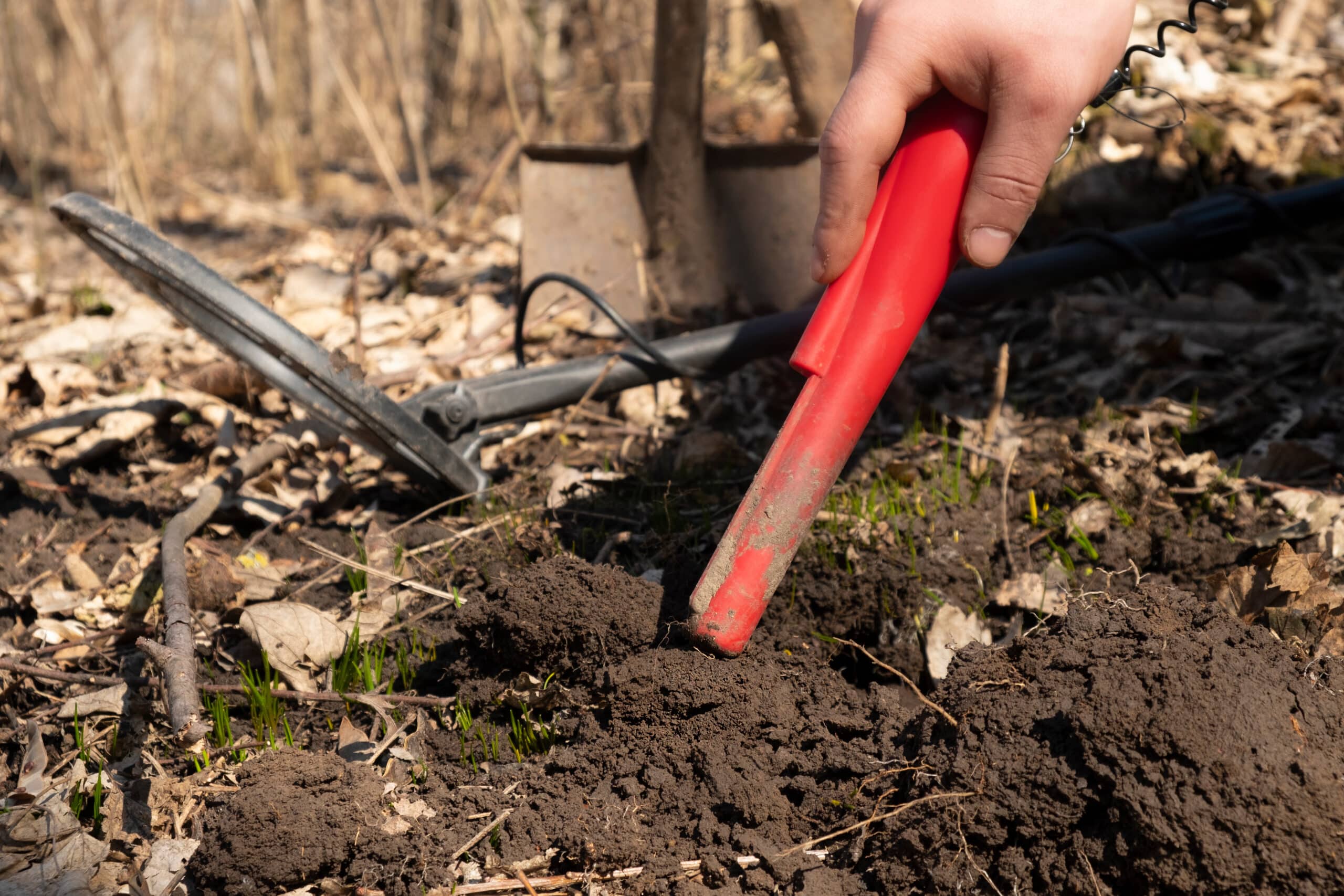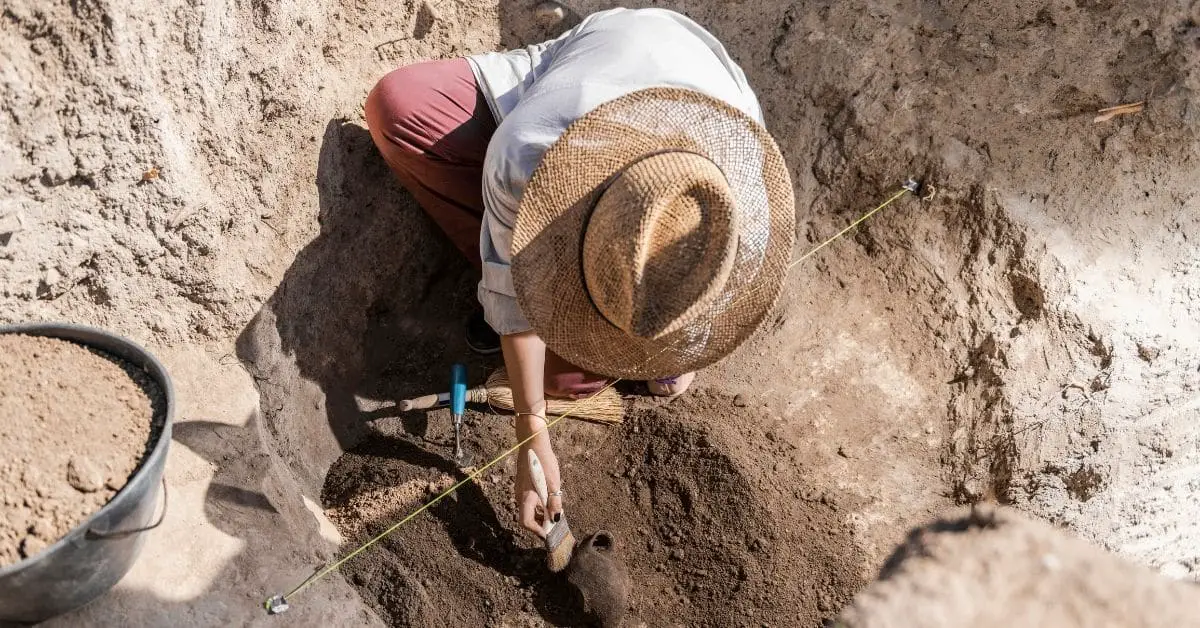Whether you are searching for lost treasures or checking for underground utilities you need the right equipment for the job. This may have you wondering when you should use a metal detector versus a magnetic locator? The right detecting equipment can expedite your searches as well as give you more accurate results.
A metal detector is designed to detect all types of metals whereas a magnetic locator is specifically designed to detect ferrous metals which means metals that contain iron. Unlike a metal detector, a magnetic locator cannot detect aluminum, brass, or copper which is one of the main reasons they are used in commercial applications.
To learn, more about the differences between a metal detector and a magnetic locator as well as what they can be used for continue reading.
Metal Detectors – How they Work

In the metal detecting world, the items you are trying to locate below the surface are referred to as targets. A metal detector works by sending electromagnetic signals through the ground from a coil at the end of a handheld shaft.
When those signals come into contact with a target, the target will create its own signals which are reflected back to the coil. When this happens it will emit a sound to notify you that you have hit a target and you can then decide if you want to investigate further.
Advances in Technology Make Detecting Easier
Some metal detectors are more sensitive and can differentiate between the types of metals in which case the detector will emit different sounds for each type of metal. Metal detectors have a control box at the top of the shaft that helps identify the metal, how deep it may be, and other useful information.
More advanced metal detectors have full-color LCD screens equipped with GPS capabilities and other handy features. This allows you to track where you have been and mark the locations of underground items. whether they be long-lost relics or the utility pipes and wires that keep our modern lives running smoothly.
Metal Detecting Pinpointers

In addition to traditional metal detectors, a smaller device can be used for a more precise target location. These devices are called pinpointers and they work in the same manner as their larger counterpart. These units are generally used in conjunction with a traditional metal detector.
When the metal detector indicates that it has located a target the pinpointer is then used to hone in the center of the target for more accurate digging. These devices remove a lot of the guesswork and therefore extra manual labor that can come with metal detecting.
To learn the difference between a metal detector and a magnetic locator continue reading for information that should clear up any questions you may have.
Digging Deeper: What is a PinPoint Metal Detector?
Magnetic Locators – How They Work Versus Metal Detectors

Although there is a visual similarity between a metal detecting pinpointer and a magnetic locator they are not to be confused with one another.
Where a traditional metal detector and pinpointer are designed to detect multiple types of metal, a magnetic locator has one specific job and that is to locate ferrous metals. Ferrous metals are metals that contain iron.
Working From Earth’s Magnetic Field
There is a big difference between the way the two devices work. Rather than emit a signal as a metal detector does, a magnetic locator measures the distortion in the magnetic field that encircles an object that is below the surface.
To understand how a magnetic locator works you need to understand that the earth itself is like a giant magnet. This magnetic field that the earth emits reacts with ferrous metals in a way that they end up emitting their own magnetic field similar to that of a magnet.
Examples of metals that are not affected by the earth’s magnetic field are:
• Aluminum
• Brass
• Copper
• Gold
These metals will not be detected by a magnetic locator for that reason. This is especially helpful if you are looking specifically for ferrous metals and don’t want to waste time having to decide which type of metal you may be detecting.
Instead of using a coil that sends an electromagnetic signal to the ground, a magnetic locator utilizes two sensors that are spaced evenly apart on the shaft. When there are no objects present the sensors will read zero.
When the magnetic field is interrupted the sensors will give off readings that will help indicate the depth, size, and orientation of that object. The magnetic locator will give off different sounds to tell you what you need to know about the object in question.
Now that you know how both devices work you may be curious to know how they are used and how they can be beneficial to our everyday lives.
Metal Detectors – Who Uses Them and Why
As you can see, there are clear differences between a metal detector and a magnetic locator but you may be unclear on who uses each device and how they are beneficial to different types of work and hobbies.
The list below gives you an idea of the different types of people and professions that can benefit from using a metal detector. The reason the people listed will benefit from a metal detector more than a magnetic locator is that they will be able to detect multiple types of metals so they will know what their target is before going through the trouble of digging.
Archeologists

Since the 1950s archeologists have been benefiting from the use of metal detectors. Using this technology has allowed many historical artifacts to be discovered and given us an even better image of how our ancestors lived in the past.
Hobbyists

Metal detecting is a great way to pass the time and maybe even find some treasure if you are lucky enough. Although metal detecting is a great hobby for people of any age, senior citizens seem to benefit from the activity as it can keep them entertained and their minds sharp.
Miners

Any prospector looking to strike it rich in the world of mining can certainly benefit from using a metal detector. Metal detectors and pinpointers are especially effective when crevicing for gold. Metal detectors can help determine if you have a good location for mining or if you should look elsewhere.
Police Officers

Your first thought when it comes to metal detectors may be law enforcement however the police have benefitted greatly from the use of metal detectors.
Metal detectors are great for revealing lost evidence of crime scenes such as:
• Bullet casings
• Weapons
• Other items that can be used as evidence
Relic Hunters
Relic hunting is not a new concept however technological advances over the years have made hunting for lost treasures even more accurate which in return increases the level of enjoyment from the activity. Without the help of a metal detector, there is no telling how many important historical treasures would still be hidden below the surface that we tread on daily.
Digging Deeper: Metal Detecting For Civil War Relics
Security Personnel
Treasure hunters are not the only people who can find the help of a metal detector useful. Although the device may differ in appearance, security officers use a metal detector to keep us safe. They want to be sure nobody is passing through their checkpoint with any dangerous weapons on their bodies or in their belongings.
The Military

Different branches of the military frequently use metal detectors to scan areas for hidden bombs and land mines. Without the advanced technology of a metal detector, there would likely be more unnecessary death due to hidden weapons.
Utility Workers
Utility workers have been known to use a metal detector or pinpointer from time to time to find different utility-related items below the surface. They can be helpful when surveying property as well.
Continue reading to learn how magnetic locators are used to prevent disasters by finding underground objects.
Magnetic locators – Knowing When One is Needed
Magnetic locators are generally used in more of a commercial settings such as those who are in excavation, septic/plumbing, property surveying, and other professions of that nature.
The reason these types of professions use a magnetic locator versus a metal detector or pinpointer is that they are looking specifically for ferrous metals.
When using a metal detector you tend to get a lot of interference from other metals that may be surrounding an object that you are trying to find such as pipes or wires.
Digging for Personal or Commercial Purposes
Whether you are digging a pool in your backyard or working commercially you must know where certain utility pipes and wires are located to avoid a potential disaster or at least a major inconvenience by tearing up something that didn’t need to be destroyed.
Digging Deeper: Will a Metal Detectors Find Buried Electrical Wire?
Land Surveyors
Land surveyors are notorious for using a magnetic locator to find corner markers. As previously mentioned when using a locater versus a detector you can essentially filter out the metals you don’t want so you can focus on your desired target.
Utility Workers
You have likely heard that you are supposed to “Call 811 before you dig.†But what does that mean? It means that anytime anyone plans on excavating whether for personal or commercial reasons they must have local utility workers come and mark where the pipes and wires are located. To do this many utility workers utilize a magnetic locater for fast accurate results.
For some visual examples of each device discussed in this article continue reading.
Examples to Give You Ideas For Your Next Task
Here is an example of each device so you can get a better idea of what they look like and how they work. The more you learn about these devices the better decision you can make when it comes time to find the right tool for your task.
Garrettâ„¢ ACE 300 Metal Detector with Headphones

Garrett is a company known for its excellence when it comes to metal detecting and security devices. You can expect superior quality and great results with the ACE 300. The submersible search coil means you don’t have to run for cover at the first sign of moisture and can explore more adventurously. A bonus is that this unit comes equipped with headphones to help you tune out distracting background noises and focus on your folly.
Garrett Pro-Pointer AT Waterproof Pinpointer

Another win by Garrett; the Pro-Pointer AT is just the tool you need for getting to the heart of your target. If you are an avid gold crevicer you know how important accuracy is when it comes to saving precious time. This pinpointer will help expedite the job and help get you to your reward at the end of the day. The bright orange color makes this device difficult to lose and makes it easier to see underwater. It is fully submersible in water that is up to 20 feet deep which is great for underwater treasure exploring or if you accidentally drop it.
Schonstedtâ„¢ Magnetic Detector

This device is simple and easy to use. Its compact size makes it a convenient tool for any utility worker or individual needing to identify an object below the surface. This device is ultra-sensitive and comes with magnetic locators made of the highest quality. A simple LDC bar graph display allows the user to see what is beneath their feet. Change the batteries with ease and stow them in their carrying case when not in use. This particular device comes with a seven-year warranty from the manufacturer.
Some Tasks Require Different Devices – Which is Best for You
When it comes to the business of finding objects below the surface one device is not necessarily better than the other. If you need to detect ferrous metals without the interference of other metals the magnetic locator will be best suited for that task.
Conversely, if you are attempting to discover lost treasure a good-quality metal detector will be a better option. Ultimately it depends on what your end goal is but either way they both provide valuable functions.